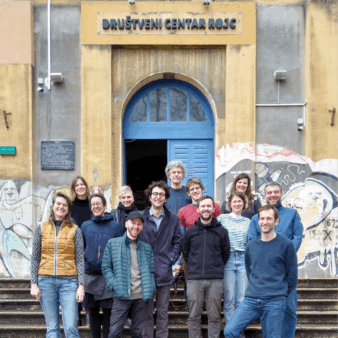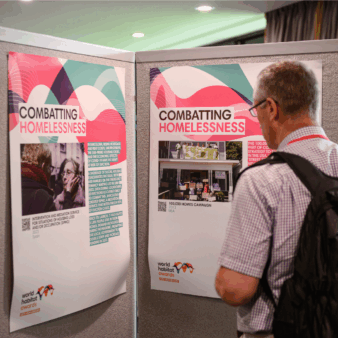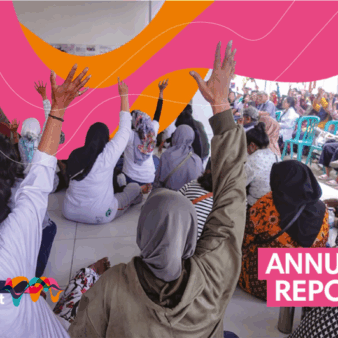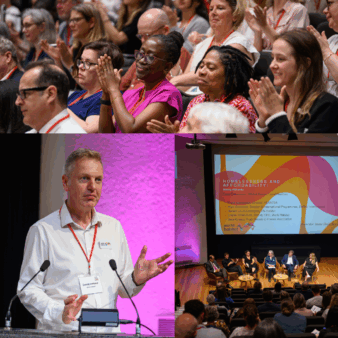Knowing our carbon footprint
World Habitat first calculated its carbon emissions in 2015 and again in 2016, with 2016 being used as the baseline year for any reductions.
Our 2016 carbon footprint was calculated to be 121 tonnes of carbon dioxide equivalent (tCO2e) with air travel constituting almost 60% of our total emissions. We have reduced this consistently and in 2024 our emissions were 29.6 tonnes.
We used the DEFRA carbon emissions calculator to measure our footprint, which includes Scope 2 and 3 emissions from:
- staff commuting to work;
- business travel (air, rail, bus, ferry, taxi);
- mileage claimed by staff, trustees and suppliers/partners;
- homeworking
- electricity used;
- water used; and
- waste disposal.
Each year since then we have been measuring our footprint, communicating these results to our staff and trustees and publishing them in our annual report.
Minimum Emissions
During 2024 we commissioned a carbon consultant to help us calculate the minimum level of annual carbon emissions we believe we need in order to achieve our objectives (our minimum emissions).
We have agreed a strategy in which we will reduce our carbon emissions by at least 5% per year and seek to achieve our minimum emissions as soon as possible.
Our minimum emissions have been calculated as follows:
- Office Emissions 4.98 tonnes
- Trustee Emissions 0.54 tonnes
- Transfer Activities (Knowledge Transfer) 14.0 tonnes
- Trophy Presentation 5.0 tonnes
- Total 24.52 tonnes
The minimum emissions don’t include emissions from World Habitat Award Evaluations. World Habitat Award Evaluations are core to our strategy and will happen every year, however it’s impossible to set a minimum in this area due to the visits being anywhere in the world. These emissions will be outside our minimum. We will report on these emissions every year.
Intensity Targets
We have implemented intensity targets based on per £ spent. This will consider any growth in the organisation, especially around special events like anniversaries. This also avoids the risk of creating a perverse incentive to avoid growth and reduce our activity levels to meet carbon targets.
Our minimum intensity target is as follows:
20 tonnes per £1 million spend *
This is based on the following:
Our current business expenditure levels of £1,221,800
Our minimum emissions of 24.52 tonnes
*Calculation – 24.52 / 1,221,800 *1,000,000
If our expenditure budget increases, then our intensity target will also increase.
Reducing our Emissions
Since 2016, we have reduced our carbon emissions from 121 tonnes to 29.6 tonnes in 2024. This represents just over a 74 percent reduction.
We developed a carbon management plan which included areas where we could reduce emissions. We have reduced our emissions by:
- Improving the energy efficiency of property owned by World Habitat in Coalville e.g. changing all lighting to LED and installing loft and cavity wall insulation;
- Switching to a renewable energy provider;
- Setting an annual organisational emission reduction target, and an annual carbon budget for each programme; and
- Regularly communicating on our carbon spending to staff and trustees.
- Including a carbon budget in all programme plans.
- Implementing a sustainable travel policy
- Training our employees in carbon literacy
- Implementing an electric car salary sacrifice scheme for all employees
- Moving to a smaller office following the COVID-19 pandemic
- Introducing hybrid working to reduce commuting and office related emissions
- Holding events online where applicable, meaning a reduction in travel related emissions
- Using local consultants to help carry our evaluation visits
- Reducing the number of staff attending events
We will continue to look for ways to reduce our carbon emissions without impacting the quantity or quality of our strategic outcomes.
Offsetting our unavoidable carbon emissions
Since 2017 we have offset our unavoidable carbon emissions with the Nubian Vault Association (AVN)’s unaccredited ACACIAS Project. AVN is a former World Habitat Award winner. The (AVN)’s Nubian Vault (NV) construction market is now established and developing in the Sahel – Burkina Faso, Mali, Senegal, Benin and Ghana. The ACACIAS project aims to accelerate the development of this market by facilitating access to NV bioclimatic housing for Sahelian families living on less than 2$ a day, thus improving their living conditions. From 2022, we offset our carbon emissions of 34 tonnes with AVN and also with an accredited Gold Standard scheme, Kenya Biogas Programme. Click here to view our certificate.
Gold Standard credit certificate 2022 offsetting
This ensures we are supporting a housing-based organisation and also offsetting our emissions using an accredited scheme. We are committed to doing this moving forward.
For 2023, we offset our carbon emissions as follows:
36 tonnes with AVN and also the accredited Gold Standard scheme, Biogas for Better Life Uganda Gold Standard credit certificate 2023 offsetting
For 2024, we offset our carbon emissions as follows:
30 tonnes with AVN and also the accredited Gold Standard scheme, Solar Cooking for Refugee Families in Chad. Click here to view our certificate.
Aligning our investments with our organisational values
We recognise that as a charity we have an influential role to play in shaping a sustainable financial system. We want to make sure that our investments are in harmony with our mission and values.
We approved a new ethical policy as part of our investment policy in 2020. This highlighted how our investments must support our values and not have a detrimental impact on the people we are trying to help.
The ethical policy ensures our investments are free from:
- arms sales to military regimes
- unethical lending practices
- human rights violations
- environmental degradation and activities – such as fossil fuel extraction – that are incompatible with the 2015 Paris Agreement to limit the increase in global average temperature to 2°C and pursue efforts to limit the increase to 1.5°C.
We commissioned an investment consultancy firm to carry out a review of our current investment funds during 2020 to see if they met our ethical policy. As a result of this work, the trustees agreed to a full review of our investments in 2021, providing a handful of investment firms with our selected criteria for the new funds, and asked them to present a fund that meets the requirements of our ethical policy and pays a total return of 4% per annum.
Following this review, our Board of Trustees agreed to move our investments to the Charity Sustainable Multi-Asset Fund – Charities – Cazenove Capital and the Sarasin Climate Active Endowments Fund. This was completed in January 2022.
In addition, we also invest in housing-related programmes that reduce carbon emissions and also help provide safe and secure housing for low-income people.
Sharing our learning and working with others
We believe it is important to share our learning, processes and work with others to bring about positive impact on the climate crisis. We are a signatory to the ACF Funder Commitment on Climate Change, which consists of six commitments or goals that World Habitat and other signatories pledge to work towards to play our part in tackling the causes and impacts of the climate emergency.
The Funder Commitment makes us accountable and ensures we stay fully committed to what we are working towards, including reporting back. It also enables us to exchange with a community of people working on similar issues and connects us to a growing #PhilanthropyForClimate global movement, which brings together various national and international philanthropy climate commitments.
We have also achieved Planet Mark certification for a fifth consecutive year, which recognises our commitment to reduce our carbon footprint by at least 5% per year. PlanetMark, an internationally recognised sustainability certification for every type of organisation, also fosters a connection to other holders of the PlanetMark resulting in shared learning and the ability to develop collaboration opportunities.
Reporting on the emissions from our Financial Investments
The ethical funds we are invested in generate carbon emissions. We are not in control of the emissions from our financial investments; however, we want to be transparent and report on them. We also want to use our voice to try and influence our investment managers, which will ultimately result in lower carbon emissions.
We are also engaging with other stakeholders to try and influence positive change.
Our scope 1,2 and 3 emissions from our investments at the end of 2024, were as follows:
Total Emissions from the Cazenove Sustainable Mutli-Asset Fund 7,338 tonnes of CO2E
The carbon emissions for Cazenove are split into the scopes
Scope 1 & 2 173 tonnes of CO2E
Scope 3 Upstream 2,114 tonnes of CO2E
Scope 3 Downstream 5,051 tonnes of CO2E
Total Emissions from the Sarasins Climate Active Endowment Fund 1,856 tonnes of CO2E
The carbon emissions for Sarasin’s are split into the scopes
Scope 1 & 2 192 tonnes of CO2E
Scope 3 Upstream 899 tonnes of CO2E
Scope 3 Downstream 765 tonnes of CO2E
We will continue to push our investment managers at Cazenove and Sarasin’s to reduce these emissions, reporting on them on an annual basis.




